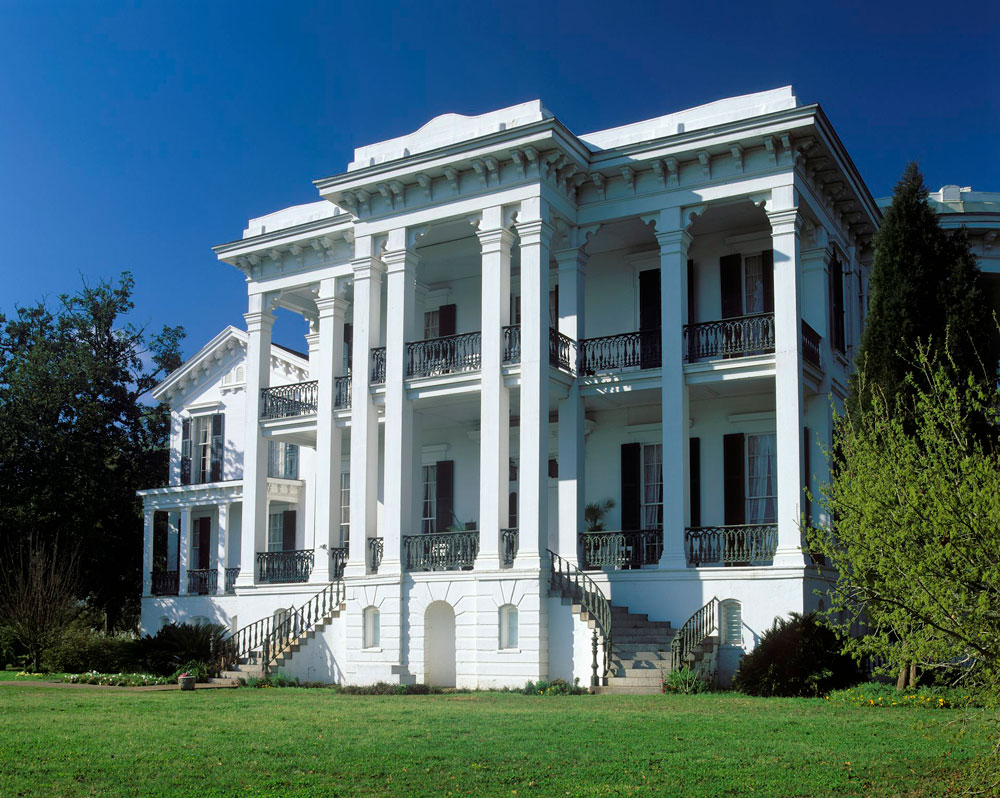
By Betsy Pudliner
The American South – and the nation more broadly – continues to wrestle with how to remember its most painful chapters. Tourism is one of the arenas where that struggle is most visible.
This tension came into sharp relief in May 2025, when the largest antebellum mansion in the region – the 19th-century estate at Nottoway Plantation in Louisiana – burned to the ground. While some historians, community members and tourism advocates mourned the loss of a landmark site, many activists and others critical of slavery’s past celebrated its destruction.
Soon after the fire, Nottoway’s owner indicated an interest in rebuilding. And within weeks, a new restaurant had opened on a different part of the site. That speed underscores how quickly memory, history and economics can collide – and how tourism sits at the center of that tension.
As a professor who studies tourism, I know that the impulse to monetize history isn’t new. Six months after the First Battle of Manassas in 1861, the site was already developing as a tourist attraction. People have been traveling to historic sites, buying souvenirs and leaving their mark on the landscape for centuries. That tradition continues, and evolves, today.
Wealth, slavery and the battle over memory
Nottoway is one of more than 300 such plantation sites across the country, which together generate billions of dollars in revenue each year. This type of tourism forces communities and visitors alike to ask a difficult question: What parts of the past do Americans preserve, and for whom?
Nottoway, completed in 1859, was built by 155 enslaved people. Blending Greek Revival and Italianate styles, it stood as a monument to wealth built on forced labor and racial exploitation. Over the decades, it passed through different owners, survived the Civil War and was eventually restored and converted into a resort and wedding venue. Critics have long argued that this commercial reinvention downplayed the lives and labor of enslaved people, neglecting the site’s foundations in brutality.
Beyond its symbolism, Nottoway has long been recognized as a cornerstone of Iberville Parish’s tourism economy. Research shows that sites like Nottoway can anchor regional economies by encouraging longer stays and local spending. These can stimulate nearby businesses through the multiplier effect.
Nottoway’s sociocultural significance was far more complex – as shown by the celebrations that followed the fire. For many, Nottoway was a site of trauma and erasure. With its white columns and manicured lawns, Nottoway was pervaded by a sense of romanticism that relied on selective memory. For example, as of June 2025, the Nottoway website’s “History” page made no mention of slavery.
In other words, the fire didn’t just destroy a building. It disrupted a layered ecosystem of economic livelihood, memory and contested meaning.
Tourism and the power of the past
To understand why people visit places like Nottoway, it helps to turn to the four main categories of travel motivation: physical, cultural, interpersonal and status. Plantation venues typically draw cultural tourists seeking heritage, history and architecture.
They also draw those engaged in what scholars call “dark tourism”: traveling to places associated with tragedy and death. While dark tourism may imply voyeurism, many such visits are deeply reflective. These travelers seek to confront hard truths and process collective memory. But if interpretation is selective – focusing on opulence while minimizing suffering – tourism then becomes a force of historical distortion.
Some tourists choose plantations for a sense of romance, others for education, and still others for reckoning. These motivations complicate how such places should be preserved, interpreted or transformed.
Over the past decade, innovative sites like the Whitney Plantation have gained national attention for centering the lives and stories of the enslaved, rather than the architecture or planter families. Opened to the public in 2014, Whitney reframed the traditional plantation tour by prioritizing historical truth over nostalgia – featuring first-person slave narratives, memorials and educational programming focused on slavery’s brutality.
This approach reflects a growing segment of travelers seeking deeper engagement with difficult histories. As Whitney draws visitors for its honesty and restorative framing, it raises a key question: Is the future of plantation tourism splitting into two tracks – one rooted in reflection, the other in romanticism?
Many Americans still picture the antebellum South through the lens of popular culture – a romanticized vision shaped by novels and films like “Gone with the Wind,” with its iconic Tara plantation. This “Tara effect” continues to influence how plantations are portrayed and remembered, often emphasizing beauty and grandeur while downplaying the brutality of slavery.
That’s why sites like the Donato House in Louisiana are important. Built and owned by Martin Donato, a formerly enslaved man who later became a landowner – and, complicating the narrative, also a slaveholder – this modest home offers a counterpoint to the opulence of estates like Nottoway.
Still in the hands of Donato’s descendants and slowly developing as a tourist site, the Donato House reflects the layered and often uncomfortable truths that challenge simple historical categories. Sites like this remind us that tourism plays a vital role in educating society about the complexity of our past. Heritage travel isn’t just about iconic landmarks; it’s about broadening our perspective, confronting historical bias and helping visitors to engage with the fuller, often uncomfortable, truths behind the stories we tell.
Controlling the narrative: Who tells the story?
What is chosen to be preserved – or let go of – shapes not only our memory of the past but our vision for the future.
When the last generation with firsthand experience of a historical moment is gone, their stories remain in fragments – photos, recordings such as those in the National Archives, or family lore. Some memories are factual, others softened or sharpened with time. That’s the nature of memory: It changes with us.
My late father, a high school history teacher, often reminded his students and his children to study the full spectrum of history: the good, the bad and the profoundly uncomfortable. He believed one must dive deep into its complexity to better understand human behavior and motivation.
He was right. Tourism has always echoed the layered realities of the human experience. Now, as Americans reckon with what was lost at Nottoway, we’re left with the question: “What story will be told – and who will get to tell it?”
![]()
Betsy Pudliner is Associate Professor of Hospitality and Technology Innovation at the University of Wisconsin-Stout.





























MITCH says
Odd that we’d want to dictate what history is allowed to be remember. Planatations in the U.S., the Pyramids of Egypt, the castles of Europe, and the old ruins of Rome all are wrapped tight with slavery being used to build them. So why pick out one country that would deny foreign visitors from visiting its history? It is OK for Americans to go abroad and visit historical sights, but let’s remove the historical sites in America. Statues that remind people of the leaders of great and fallen civilizations / countries / cultural movements reminds us of what happens when apathy spreads and relinquishes control, history then will become forgotten ashes to be repeated. America seems to be the only country that does not want to learn from history but wants to destroy history as a political pawn. No Plantations, no Pyramids, no castles, and no ruins of Rome will ever be able to remove the depths of what humanity has traveled – remove them from sight, remove them from tourism, why? The problem is not with the images of the past. Do the Pyramids of Egypt cause Egyptians tension? Do the Castles of Europe cause Europeans tension? Do the ruins of Rome cause Italians tension? No, because they know that form of slavery will never return. Maybe America has something to learn from Egypt, European Countries, and Italy. Their past is not dead; it’s just their past is not in control.
Laurel says
The burning down of history should not be celebrated. I have visited some of these plantations, both in South Carolina, and in Florida. To see how people lived, in grandeur, in direct contrast to those who served as slaves, makes a mark on a person’s soul. To walk inside of the tiny ruins of one room *homes* that the slaves lived in, gives a person a feeling that can not be generated the same way in books. It is a sense to be experienced. A new awareness of how people survived the unimaginable. One can understand, a little bit better, how it was by observing the fields these people worked in, while their “owners” sat by in luxury.
I could not ever fully understand how Auschwitz was, without walking through the, now, museums containing piles of shoes and glasses of those who were killed there. Is it “dark tourism”? No, I think it is educational, on a deeper level. The whole point of preserving the past.
What we should be concerned about now, is a president who is building an unnecessary ballroom, pouring cement over the Rose Garden, filling the Oval Office with gilded kitsch, and directing our amazing Smithsonian to omit “uncomfortable” history, and redirecting it to serve the notion of how it should be by the Heritage Foundation. He is “romanticizing” our history right now.
Sherry says
Laurel. . . while I personally now choose to bypass places of human torture and pain, there is education to be gained by preserving and reverently visiting such authentically historic places.
For me, “rebuilding” such a place and adding a restaurant destroys the authenticity and turns it into Las Vegas or Disney.
IMO- “Celebrating” and uplifting the statue of a Confederate general who fought to preserve slavery is quite different. For me, that is more akin to having a huge statue of Hitler raised up in a major German city.
Atwp says
If a person want to visit the big buildings so be it. They do have a history. I visited the African Museum in D.C. a few years ago. Good history of demonic actions. It is interesting this country is trying to eliminate the teachings of the horrors of slavery from the past and preserve the statues and buildings of the demonic slave holders. Often wonder who is the lesser evil, Hitler or Jim Crowe. I would say Hitler.